Understanding Pet Bird Behavior and Its Impacts

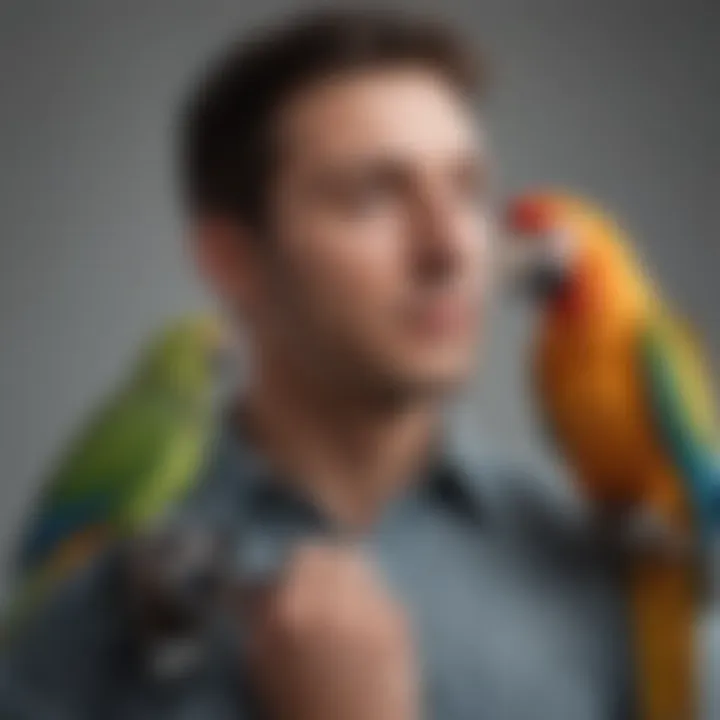
Intro
Pet birds occupy a unique position within the animal kingdom. Their vibrant colors, cheerful chirps, and energetic personalities bring a liveliness that captivates countless households. However, it’s not just their charm that can surprise unsuspecting owners; the reality of pet bird behavior, particularly regarding their waste management, often comes as a shock. Many might think of birds as clean creatures that flutter gracefully about. Yet, the moment enthusiasm turns into unexpected deposits on their owners can lead to frustration and confusion.
Understanding the dynamics behind why pet birds relieve themselves on their humans reflects a deeper comprehension of their behavior. Also, when grasping these instincts can lend valuable insights into managing the implications that arise in daily life—ranging from necessary hygiene practices to strengthening the bond between bird and owner.
In the following sections, we will dissect various facets of living with pet birds, including care tips, behavioral insights, and practical strategies that can reshape your cohabitation experience. We'll explore how effective management not only prevents accidents but also enriches the relationship between you and your feathered companion.
Care Tips
Owning a bird comes with its set of responsibilities. Beyond the feathers and noises, ensuring the well-being of your avian friend is paramount.
Daily Care Routines
Establishing a consistent daily care routine helps both the owner and the bird feel more secure. Birds thrive on predictability. Mornings can start with fresh food, followed by a thorough check of the cage and toys. Whether it's filling the water bowl or giving some love and attention, these small acts can make a world of difference.
Cage Setup and Maintenance
Birds need a proper environment to flourish. The choice of cage should reflect the kind of bird you have. Larger breeds, for instance, require significant space to move.
- Keep tools ready for regular cleaning sessions—tools can include brushes and natural, safe cleaning solutions.
- Ensure that perches are appropriately placed and vary in size to maintain foot health.
Hygiene and Cleaning Practices
It’s essential to maintain a clean environment, not just for appearance but also for the health of your bird. A weekly deep clean might include washing perches, food dishes, and the cage floor.
"Regular cleaning can prevent the spread of bacteria and harmful diseases."
Seasonal Care Adjustments
As seasons change, so should your care routines. For instance, during the colder months, ensuring warmth becomes vital. Extra bedding or repositioning the cage away from drafts can help tremendously.
Behavioral Insights
Birds communicate not just through vocalization but also body language. Understanding these cues can inform how you interact with your pet, promoting a more harmonious home.
Understanding Bird Body Language
Observing your bird's stance can reveal much about their mood. Fluffed feathers may indicate a feeling of safety, while raised wings could mean they are ready to play. Always pay attention to how they react during various situations.
Common Behavioral Issues and Solutions
Birds can be prone to behavioral problems. Some common issues include excessive screeching, destructive chewing, or feather plucking. Identifying triggers is crucial. Is your bird bored? Lonely? Implementing a structured daily schedule can mitigate many issues.
Positive Reinforcement Techniques
Using treats and praise when your bird displays desired behaviors can effectively shape their patterns. For example, rewarding them for using a designated spot can help guide natural tendencies rather than restrict them.
Social Interaction Needs
Birds are inherently social beings. Lack of interaction can lead to behavior concerns or stress. Engaging with your bird through social activities can build a robust bond.
Nutrition Guides
Proper nutrition forms the backbone of a bird's health. Understanding what goes into their diet is essential to preventing health problems down the line.
Essential Diet Components
Variety is key—seed mixes, pellet-based diets, and fresh fruits and vegetables should all play a part. Each species has specific needs, so it's critical to educate yourself on what your particular bird requires.
Safe and Toxic Foods
Some human foods are downright dangerous for birds. Avocado and chocolate are prime examples of substances that can be lethal. Always refer to a reliable source when in doubt about what you're offering.
Supplements and Treats
While a well-balanced diet is vital, sometimes supplementation is necessary. Calcium and vitamins should always be considered, particularly if your bird shows signs of deficiency.
Feeding Strategies for Different Species
Adjusting feeding practices shouldn't be an afterthought. Larger birds might require different portion sizes and feeding times than smaller parrots. Monitor their eating habits closely for optimal health.
Wellness and Health
To help your pet thrive, regularly monitoring health is crucial.
Routine Health Checkups
Visits to an avian vet should occur annually, at the very least. These checkups can catch potential problems early and provide opportunities to ask questions about pet care.
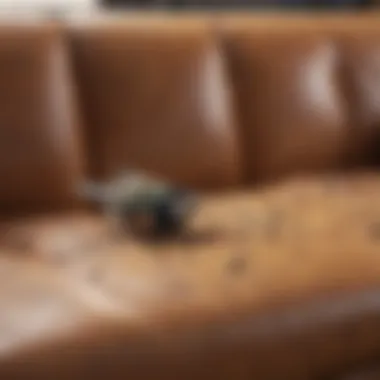
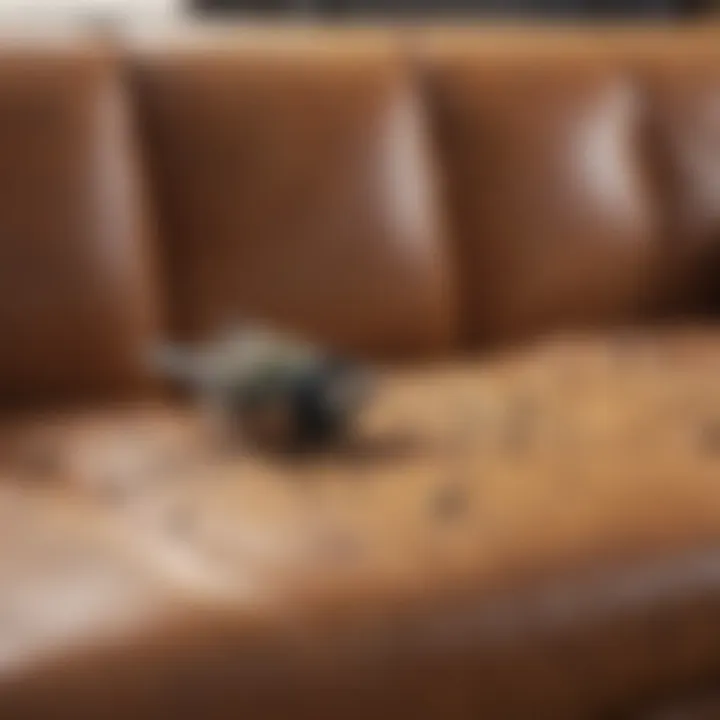
Identifying Symptoms of Illness
Subtle changes in behavior may indicate illness. Lack of appetite or lethargy shouldn't be brushed aside—they might spell trouble for your bird.
Preventative Care and Vaccinations
Consulting your vet about necessary vaccinations can prevent many diseases. Being proactive can save a lot of heartache in the long run.
Mental and Emotional Well-being
Birds experience stress just like other pets. Providing an enriching and stimulating environment can mitigate behavioral issues, creating a comprehensive sense of well-being.
Enriching Activities
A bored bird is an unhappy bird. Engaging in stimulating activities is crucial for a healthy, happy pet.
Toys and Playtime Ideas
Offer a variety of toys, including chewable ones, puzzles, or foraging structures. Regularly switching toys keeps the environment fresh.
Training and Tricks
Teaching your bird tricks can be a gratifying activity for both parties. Start small with simple commands and reward them for success.
Outdoor Activities and Interaction
Birds can greatly benefit from outdoor time. Supervised outings to safe areas can offer new experiences that enrich their lives.
DIY Projects for Mental Stimulation
Simple cardboard boxes or other materials can create DIY toys, which help keep costs down while providing challenges for your bird. Get creative!
By diving into the daily lives of our feathered companions, understanding their behavior, and proactively managing their needs, we set the stage for a fulfilling and harmonious life together.
Preface to Pet Bird Behavior
Understanding the behavior of pet birds is like peeling an onion; each layer reveals new insights into these complex creatures. Bird behavior is not just a quirk; it’s a language. Delving into it allows pet owners not only to recognize their feathered companions’ moods and needs but also to foster a healthier relationship with them. Bird owners who grasp these behaviors stand to benefit in various ways, from reducing stress for both bird and owner to minimizing unintentional messes, such as unexpected droppings.
Understanding Avian Physiology
To better comprehend bird behavior, it’s crucial to start with avian physiology. Birds are built quite differently than mammals. Their digestive systems are efficient, designed to process food and eliminate waste quickly. This is where the old saying, “Time is of the essence,” rings true. Birds can excrete waste shortly after eating, which means they have less control over when and where they do it compared to other pets. In the wild, this rapid digestion aids survival by minimizing the scent that could attract predators, but in a home environment, it can lead to surprising and sometimes annoying messes.
Additionally, their unique body structure contributes to their behaviors. Birds have a cloaca, a multi-purpose opening that combines their digestive and urinary systems. This anatomical design allows them to produce waste efficiently, yet it also means owners may find themselves in the line of fire more often than they would like. Understanding this factor helps pet owners better anticipate their birds’ needs and plan accordingly.
Birds and Their Natural Instincts
Recognizing that birds are driven by their instincts is key to understanding their behavior in a domestic setting. Most birds, by nature, are social creatures. They thrive on interaction, not just with other birds but with their human caretakers as well. When birds feel secure and engaged, they are likely to exhibit fewer stressful behaviors, including those that result in messes. If they sense that their territory is being threatened, it can lead to a myriad of behavioral issues, including the tendency to poop on their owners as a way to mark their territory.
Strongly tied to their instincts is their need for routine. Birds are creatures of habit, and changes to their environment can stir up stress and result in unwanted behaviors. For instance, if a new pet arrives, or if furniture is rearranged significantly, birds may respond unpredictably. Realizing that these behavior patterns stem from deep-rooted instincts can aid owners in proactively managing their birds’ environment and reducing the frequency of accidental messes.
"Understanding your bird's needs and instincts can transform your relationship from merely pet-owner to a deeper companionship."
In sum, the intricate relationship between avian physiology and natural instincts lays the groundwork for understanding the behaviors exhibited by pet birds. This foundation not only enhances the owners' knowledge but also paves the way toward a more harmonious home life with their feathered friends.
The Nature of Bird Droppings
Understanding the nature of bird droppings is crucial for bird owners. It provides insights into the overall health of your feathered friends as well as a glimpse into their dietary habits. Not only does it alert us to potential health problems, but it can also affect the way we interact with them, especially when accidents happen. Knowing what to expect when it comes to your bird's waste can help create a more harmonious living environment for both you and your pet.
Composition of Bird Waste
Bird droppings consist of two primary components: feces and urates. The fecal matter usually presents a darker, more solid texture, while the urates appear as a whitish paste. This combination indicates that birds have a different means of excreting waste compared to mammals. The solid waste is the undigested food and other materials that need elimination, while the urates are a product of the metabolic process, similar to urine in higher mammals.
Various factors influence the composition of bird droppings, including:
- Diet: Birds that consume a diet high in seeds will produce droppings that appear different in texture and color compared to those eating fruits or pellets. A balanced diet rich in greens often leads to more uniform waste, whereas a high-fat diet can cause messier droppings.
- Hydration Levels: A well-hydrated bird will have wetter droppings, which may lead to greater messes. Conversely, a dehydrated bird may produce drier, smaller droppings.
- Health Status: Changes in droppings can signify underlying health issues. For instance, unusual colors or consistencies may suggest that a vet visit is warranted.
Checking your bird's droppings regularly isn't just about hygiene; it's an essential part of monitoring their well-being.
Frequency and Timing of Defecation
Birds tend to have a different bathroom schedule than other pets. Understanding their timing can be a critical factor in managing accidents. Most pet birds will relieve themselves frequently throughout the day, often coinciding with their feeding routines. For instance:
- During Playtime: Many pet birds tend to defecate more when engaged in physical activity or playing. If you see your bird bobbing about, it might be time to prepare for potential messes.
- After Eating: Birds are likely to excrete shortly after eating as their digestive system processes food efficiently. Owners often notice a pattern where droppings increase right after mealtime.
It's important to note that stressful situations, such as loud noises or new environments, can lead to increased defecation. A well-adjusted bird may also follow the lead of its owners; if it senses a calm atmosphere, it might relieve itself more regularly, aligning with your own routines.
Being aware of these patterns can lower the odds of unwanted surprises.
"Monitoring your bird's droppings is like keeping a diary of their health; it tells a story you might not otherwise notice."
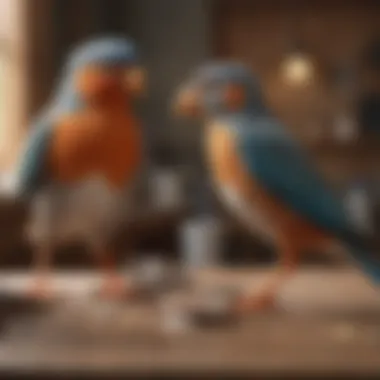
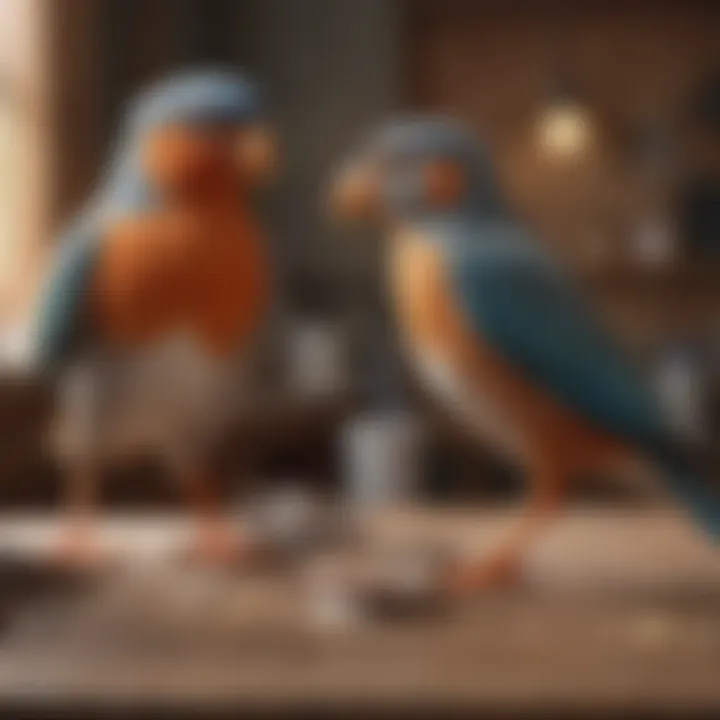
Ultimately, recognizing the characteristics and timing of bird droppings is essential for any bird owner. It helps not just in maintenance and cleanliness, but also in catching potential health issues early.
Reasons Your Bird Might Poop on You
Understanding the reasons why your bird might choose to relieve itself on you is crucial for both pet owners and the avian companions they cherish. This section is not merely about hygiene, although that is undeniably a factor; rather, it explores deeper elements of bird behavior and communication that can significantly impact the owner-bird dynamic. Recognizing these motivations allows you to develop a more empathetic approach towards your feathered friend, transforming potential frustrations into learning experiences. As you learn to interpret your bird's actions, you'll be better equipped to strengthen your bond while minimizing those unwanted surprises.
Marking Territory
Birds, in their natural habitats, often establish territory, and this behavior can extend to their human companions. When your pet bird poops on you, it may be signaling that it sees you as part of its domain. This action can be a way for it to assert dominance or comfort. Birds utilize various methods to mark their territory, with droppings being an instinctive handle on expressing ownership.
- Understanding Territorial Behavior
- Observing Patterns
- Birds are wired to set boundaries. When they feel secure in their environment, that includes you, their human.
- Their interactions with you might become a show of affection or a need for asserting their space.
- Take notice if this behavior occurs more frequently in specific circumstances or times of the day. Is your bird feeling threatened, or is it simply showcasing its bond with you?
"Birds often see their owners not just as caretakers but as part of their social flock, which brings its set of unique behaviors."
Seeking Attention
Attention-seeking is another fundamental reason for this less-than-pleasant act. Birds crave interaction, and being social creatures, they may use any means available to gain your focus. If your bird poops on you after being neglected for a while, it might just be its way of saying, "Hey, don’t forget about me!"
- Behavioral Cues
- Encouraging Positive Interaction
- Observe if your bird's need for attention correlates with its dropping habits. If droppings appear around the same time as it seems to want interaction, it points to this need.
- Activities that typically elicit attention might include setting down your phone or getting absorbed in household chores.
- Make it a point to spend quality time engaging with your bird. Consider interactive toys or dedicated playtime to address its desire for affection, thereby reducing its need to resort to the drastic measure of pooping on you for attention.
Stress and Health Issues
Sometimes, the droppings can be a distress signal. Stress in birds can stem from various sources—the environment, changes in routine, or health-related matters. If your bird has an irregular dropping schedule or exhibits signs of discomfort, it’s pertinent to observe closely.
- Identifying Stress Factors
- Health Indicators
- Change of scenery, loud noises, or the addition of new pets can trigger stress responses. If your pet seems anxious, those accidental messes might be a reaction to its feelings.
- Taking note of behavioral changes along with dropping patterns can lead to better food, health, and overall care decisions.
- Consistent unusual droppings can also indicate health concerns. If the mess does not fit the usual pattern, don't take chances; consult your avian veterinarian for advice.
Understanding these nuances in pet bird behavior allows owners to respond thoughtfully, turning a potentially frustrating situation into opportunities for connection and improvement. By embracing the complexities of your pet’s behavior, you will cultivate a more harmonious living environment.
Impact on the Owner-Bird Relationship
The relationship between a pet bird and its owner is intricate and layered, with behavior and interaction playing significant roles. When discussing the impact of accidental messes, it’s crucial to recognize how these occurrences can alter perceptions and dynamics. Birds, as social creatures, thrive on their connections with humans. However, when droppings become a common part of interactions, they can lead to frustration and misunderstanding.
Perceptual Shifts in Bird Care
A significant aspect of owning a pet bird is how owners perceive those quirky behaviors. Initially, new bird owners might blush, sweep it under the rug figuratively speaking, and rationalize messy moments as mere accidents. However, understanding the behavioral motives behind dropping waste on their caregivers requires a deeper comprehension of avian instincts. Owners must shift from viewing these messes solely as inconvenient acts to recognizing them as signals of affection or stress. This shift in perception can bring about a more empathetic approach to bird care.
Here are a few key points that illustrate how perceptual changes can enhance the owner-bird bond:
- Understanding Ownership: Instead of being annoyed by accidents, owners can view these moments as signs of trust. Birds often seek proximity to their humans, and this territorial marking can reframe the mess as an initiation into shared space.
- Building Rapport: Acknowledging these behaviors may foster a deeper connection. The more you learn why your bird behaves the way it does, the better you can cater to its needs.
- Redefining Boundaries: Accepting that mess comes with the territory encourages a mindset of training and adaptability. This can lead to less resentment and more understanding.
"Every mess is an opportunity to learn something about your feathered friend."
Establishing Boundaries and Understanding Behavior
To navigate the complexities of bird ownership efficiently, establishing clear boundaries is vital. Though it may seem contrary to the idea of a cozy relationship, setting limits around acceptable behavior helps reinforce communication between bird and owner. It’s not just about limiting messes; it’s about forging a bond based on mutual respect.
A few effective strategies include:
- Setting Designated Spaces: Allocate areas specifically for feeding or playtime. By teaching your bird where it’s okay to perch or explore, you give it a sense of security and direction.
- Consistency in Training: Implement consistent cues and reactions. If your bird learns that certain behaviors lead to a desired outcome, whether attention or a reward, it’s likely to repeat those actions.
- Being Observant: Take the time to observe your bird’s behaviors closely. Understanding when stress or joy triggers messes can aid in your response and help develop strategies to mitigate future incidents.
By understanding and respecting the dynamics at play in your relationship, you nurture a healthier coexistence. This not only makes daily life more pleasant but also deepens the bond between bird and owner, turning messes from a nuisance into an aspect of shared experience.
Strategies for Management and Cleaning
Keeping a pet bird is often a rewarding endeavor, but it comes with its unique challenges, especially when it comes to managing accidental messes caused by your feathery companion. Understanding the dynamics of pet bird behavior is fundamental. This section aims to equip you with strategies that will not only facilitate the cleaning process but also enhance your overall experience as a bird owner. Having proper management strategies in place can save you grief and even improve the bond between you and your bird.
Preventive Measures
To tackle the issue of messes effectively, preventive action is always better than dealing with the aftermath of an . One of the ssimplest yet most effective preventive measures is placing your bird's perch or sitting space over easily cleaned surfaces. Think tile or linoleum for flooring; these materials help your life when spills happen. Also, consider utilizing bird-safe blankets or mats that you can easily toss in the wash.
Moreover, establishing a routine for when your bird is out of its cage can significantly lessen the chances of unexpected messes. Keeping an eye on your bird's habits can alert you to when it's about to do its business. You might notice that your bird often takes a certain stance or moves to a specific area before relieving itself. This is a clear signal for you to intervene and redirect them if possible. A little bit of observation goes a long way.
"An ounce of prevention is worth a pound of cure." – Benjamin Franklin
Effective Cleaning Techniques
Even with preventive measures in place, accidents may still occur. When they do, knowing the right cleaning techniques can make all the difference. When faced with bird droppings, time is of the essence. Quickly attending to the mess keeps it from becoming a more challenging stain.
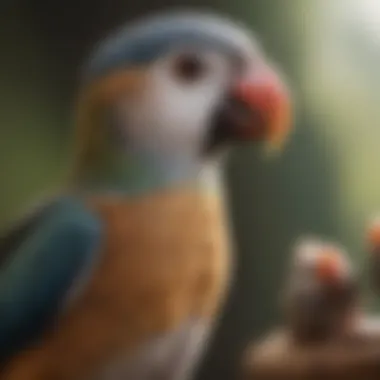
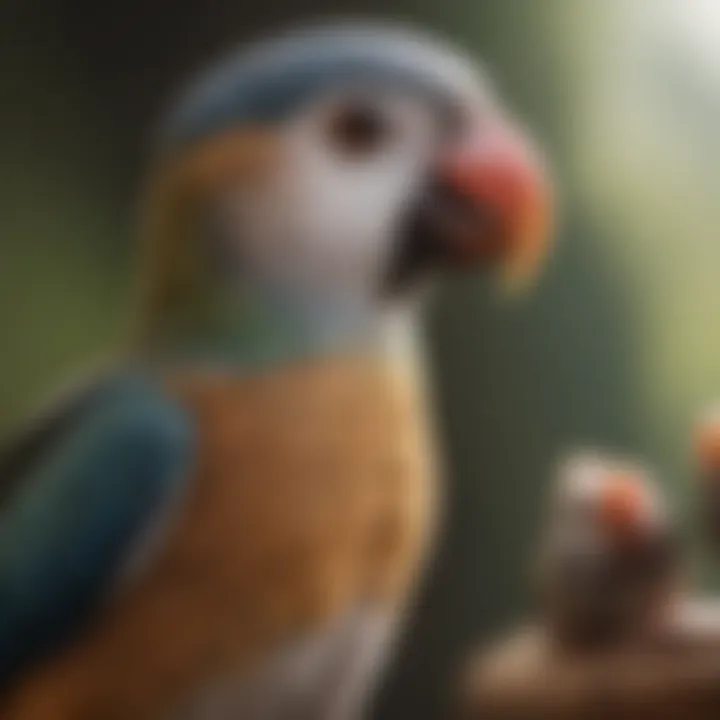
Begin by using paper towels or a cloth to gently blot the area, absorbing as much as possible. Avoid abrasive materials, as they can damage surfaces, particularly if they’re treated wood or fabrics. After blotting, it’s crucial to sanitize the area to eliminate any potential pathogens. A mixture of vinegar and water can act as an excellent natural cleaner. Simply dilute equal parts vinegar and water in a spray bottle, spritz the area, and wipe it clean.
Also, consider using enzymatic cleaners specifically designed for pet waste. These products break down organic material minimising odors and stains. They can be particularly effective on porous surfaces where droppings might seep in.
Selecting Appropriate Materials for Cleanup
Choosing the right cleaning materials greatly enhances the efficiency of your cleanup process. There are various products available, but not all are bird-safe. When selecting cleaning materials, prioritize those that are non-toxic and effective. For instance, avoid cleaners that contain bleach or harsh chemicals; even residual fumes can be harmful to your bird’s delicate respiratory system.
Furthermore, consider having tools designated for cleaning bird messes. A small bucket for dirty towels or a dustpan specifically for bird-related clean-up can simplify post-accident routines. Opt for washable, reusable materials like microfiber cloths instead of disposable wipes, which can add up in cost and waste.
In summary, managing the messes related to bird behavior doesn't have to be a daunting task. By engaging in preventive measures, applying effective cleaning techniques promptly, and selecting the right materials, you can maintain a clean environment for both you and your pet. The importance of a proactive approach to cleaning is not just about hygiene; it also plays a crucial role in fostering a harmonious living arrangement with your feathered friend.
Creating an Acceptable Environment
When it comes to sharing your space with a pet bird, creating an atmosphere that caters to their needs while keeping your living area tidy is crucial. The environment can significantly affect their behavior and well-being. A well-thought-out environment can mitigate messes and promote a harmonious relation between you and your avian friend.
Designated Areas for Bird Activities
Setting up specific zones for your bird to flit about can work wonders. These designated areas should be separate from your personal zones. Think about it: when birds have a specific space, they tend to stick to the rules of that area. You can hang swings, install play gyms, or set up perches in these locales. It’s like having a designated playroom.
Here are a few practical points to consider when setting up these spaces:
- Accessibility: Ensure the area is easy for your bird to access while also convenient for you. A nice perch close to the ground might do the trick.
- Safety: Birds are curious creatures, so make sure there’s nothing hazardous around. Remove any toxic plants or breakable items from the vicinity.
- Comfort: Add cozy spots like blankets or toys. A place where a bird feels safe will encourage them to explore—but with safety in mind.
- Visual barriers: Depending on the bird, using partitions can help create a sense of security, making them less likely to feel overwhelmed and, thus, less prone to accidents.
By creating these spaces, you also provide mental stimulation, which is another layer to preventing unwanted messes. Birds tend to relieve themselves when they’re relaxed, and having a dedicated area can facilitate that relaxation.
Training Your Bird for Positive Reinforcement
Training often feels like a daunting task, but it’s a breeze when you use positive reinforcement. It's all about rewarding good behavior rather than punishing the undesirable ones. It’s like teaching a child—never starts with the stick; the carrot always goes first.
When it comes to bathroom habits, timing is everything. Daily routines matter for birds, and recognizing their patterns allows for effective training. Use these tips:
- Observe Timing: Take note of when your bird tends to go. Is it after eating or playtime? Knowing this helps you anticipate behavior.
- Timing for Rewards: The key is to reward them just after they perform their bathroom duties in the right spot. It could be a treat—something like high-quality seeds.
- Use Command Words: Introduce simple phrases along with their actions. Words like “go potty” can serve as cues when it’s time for them to relieve themselves.
- Patience is a Virtue: Remember, this takes time. Stay consistent and keep it positive. If they mess up, simply clean it up and redirect them calmly to the right spot.
Creating an acceptable environment is not just about cleanliness; it’s a comprehensive way of ensuring that both you and your bird thrive. By dedicating specific areas for activities and utilizing positive training, you will not only reduce accidental messes but also foster a better bond with your feathered companion.
“The better the environment, the happier the bird. A happy bird is less likely to create unexpected messes.”
Educating Others about Bird Behavior
Understanding pet bird behavior is vital not just for the bird owner, but for anyone interacting with these feathered companions. By educating friends and family about the unique characteristics and natural tendencies of pet birds, we create a more harmonious living environment. It can help prevent misunderstandings that arise from common behaviors, such as accidental messes. The more informed the people around your bird, the smoother the relationship will be.
Sharing Insights with Friends and Family
When you share insights about pet bird behavior, you open the door to a deeper understanding of these creatures. For instance, explaining why your parrot might be vocal at certain times can help friends appreciate its need for social interaction. "He's just being chatty!" can easily translate into acceptance rather than annoyance.
A few ideas when sharing this knowledge:
- Discuss the importance of routines: Birds benefit from structure just like humans do. Make it clear that they thrive on daily schedules for feeding and socialization.
- Highlight their social nature: Birds are flock animals. Let your loved ones know that any sudden changes in routine or environment can stress them out.
- Talk about their diets and habits: Use simple language to explain what foods are safe and what behaviors might indicate that something is wrong.
Your sharing fosters a supportive environment, making it less likely that guests will feel frustrated about your bird's behavior.
Advocating for Understanding and Tolerance
Advocacy doesn't just stop at helping friends and family understand your pet bird's behavior. It's about creating a culture of tolerance towards all pets. Many people may not have experience with birds, and preconceived notions about cleanliness and control may arise. By advocating for understanding, you emphasize the need for patience, akin to managing a toddler's whims. Birds have their quirks, and most of the time, these behaviors don't come from malice but from instinct or necessity.
Here are some helpful points to consider:
- Educate about species-specific behaviors: Many birds have unique habits that differ widely across species. For example, some birds may be more prone to leaving droppings in certain areas simply due to their natural instincts.
- Encourage empathy towards birds: Make it clear that just like humans, birds might not always have control over their actions, especially in stressful situations.
- Promote open discussions: Allow family and friends to express any concerns or misunderstandings and resolve them through conversation rather than judgment.
"Educating others about the behaviors of your pet bird isn’t just about providing information; it's about fostering a more understanding and supportive community."
By taking these steps, you not only protect your bond with your pet but also pave the way for a more enjoyable experience for everyone who interacts with your bird. This ultimately leads to a happier household where both the owner and pet feel understood and valued.
End: Enhancing Coexistence with Your Pet Bird
As we wrap up our exploration into the world of pet bird behavior, it’s essential to emphasize how understanding their unique needs and habits can significantly improve the bond between you and your feathered friend. The occasional mess of bird droppings, while often seen as an inconvenience, serves as a critical reminder of the interplay between avian instincts and the life they share with you. Acknowledging and addressing these accidental messes is not merely about maintaining cleanliness—it's about fostering a deeper understanding of your bird's nature.
Embracing Challenges as Learning Opportunities
Every challenge presents a chance to learn more about your pet. When a bird poops on you, it’s easy to react with frustration or embarrassment. However, if we take a moment to step back, we can see these incidents as valuable insights into avian behavior. For instance, when your bird relieves itself during cuddling, consider it a sign of comfort with you. These situations can lead to a greater understanding of your bird’s comfort levels and behavioral patterns.
To embrace this dynamic, try to observe the circumstances around these messes. Does your bird often poop when agitated, or do they do it when they're particularly relaxed? This framework fosters a dialogue between you and your pet. Here are a few considerations to keep in mind:
- Gathering insights: Recognizing connections between your bird’s behavior and their environment can help you adapt their space for a more harmonious coexistence.
- Using knowledge: The more you know about why these messes happen, the better equipped you are to address them respectfully. Finding a happy medium that respects their instincts while keeping your space tidy is not just practical, it’s essential for a fulfilling pet-owner experience.
Importance of Patience and Adaptation
In the journey of pet ownership, discovering the balance between your expectations and your bird’s natural instincts requires patience. Birds, like all pets, are creatures of habit, and they need time to adjust to the boundaries you set. As an owner, your role isn’t just as a caretaker, but as a guide who can help shape behaviors conducive to a shared living environment.
Adaptation is equally crucial. Here are some tips for fostering patience and understanding:
- Establish routines: Birds thrive on predictability. If you can anticipate when accidents are more likely to occur, you can proactively manage those moments.
- Training: Engaging in positive reinforcement training helps your bird learn where it’s appropriate to relieve itself. This takes patience, but the payoffs are well worth it.
- Flexibility: Sometimes circumstances change. If your bird starts to act out, it might be signaling stress or a need for more attention. Responding with flexibility rather than frustration can strengthen your bond.
As a pet bird owner, understanding the nuances of your pet's behavior enhances not just your cleaning routines, but more importantly, the relationship with your feathered companion, allowing for a more gratifying cohabitation experience.
Ultimately, by embracing the challenges that come with pet ownership and exercising patience in understanding your bird’s nature, you can create a fulfilling coexistence that brings joy to both you and your avian friend. The messes may never fully stop, but the lessons they teach can lead to a deeper appreciation of the unique dynamics involved in your shared life.















